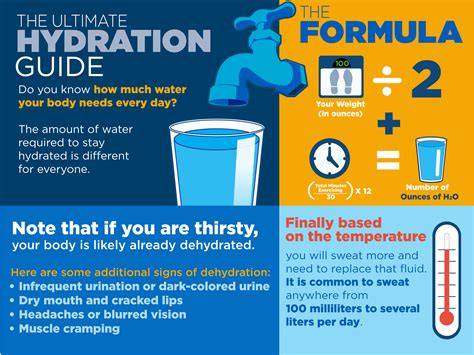The Importance of Hydration: How Much Water Do You Need?

Stay healthy by understanding the importance of hydration, determining your daily water intake, recognizing signs of dehydration, and learning strategies for staying properly hydrated.Staying properly hydrated is crucial for our overall health and well-being. Water is essential for practically every bodily function, from regulating body temperature to aiding in digestion and nutrient absorption. But how much water do you really need to drink each day? In this blog post, we’ll delve into the importance of hydration and why it’s essential to understand how much water your body requires. We’ll explore factors that affect hydration levels, such as climate, physical activity, and overall health. We’ll also discuss how to determine your daily water intake and provide strategies for staying properly hydrated. Additionally, we’ll cover the potential signs of dehydration to watch out for, and the implications of failing to meet your body’s water needs. By the end of this post, you’ll have a better understanding of the significance of hydration and how to ensure you’re meeting your body’s water requirements for optimal health.
Understanding the Importance of Hydration
Hydration is an essential aspect of overall health and well-being. The human body is made up of about 60% water, and every system depends on it to function properly. From regulating body temperature to aiding in digestion, water is crucial for maintaining optimal health. Dehydration can lead to a range of health issues, including fatigue, headaches, and even more serious complications if not addressed. Therefore, it is important to understand the significance of staying properly hydrated.
One way to determine the importance of hydration is by considering the daily water intake requirement. The amount of water needed varies from person to person depending on factors such as age, weight, and activity level. While the commonly recommended 8 cups a day is a good starting point, it may not be sufficient for everyone. Understanding your individual hydration needs is crucial in ensuring you maintain the proper balance.
There are also various factors affecting hydration levels that individuals should be aware of. These include environmental conditions, physical activity, and dietary choices. Hot weather, intense workouts, and excessive caffeine or alcohol consumption can all contribute to increased fluid loss. Being mindful of these factors can help in making informed decisions about hydration and implementing strategies to maintain adequate water levels in the body.
Determining Your Daily Water Intake
Understanding how much water you need to drink every day can be crucial for maintaining good health. Several factors can influence your daily water intake, including your age, weight, activity level, and the climate you live in. It is recommended that the average adult should drink at least 8 glasses of water per day, but this can vary depending on individual needs.
One way to determine your daily water intake is to consider your activity level. If you are physically active or exercise regularly, you will need to drink more water to replace the fluids lost through sweat. In addition, the climate and temperature in your environment can also affect how much water you need. Hot and humid weather can cause you to sweat more, leading to increased water loss that needs to be replenished.
Another method to determine your daily water intake is to listen to your body’s signals. Pay attention to your thirst levels, the color of your urine, and how often you visit the bathroom. Thirst is a clear indicator that your body needs more water, and dark yellow urine can be a sign of dehydration. By monitoring these cues, you can adjust your water intake accordingly and ensure that you are staying properly hydrated.
Factors Affecting Hydration Levels
Factors Affecting Hydration Levels
Factors affecting hydration levels can vary from person to person and can be influenced by a variety of external and internal factors. One of the most significant factors affecting hydration levels is the amount of physical activity a person engages in. Athletes and individuals who engage in high levels of physical exertion will naturally require more fluid intake to compensate for the water lost through sweat and increased respiration. Additionally, environmental factors such as heat and humidity can also play a role in affecting hydration levels. In hot and humid environments, the body will require more water to maintain proper hydration levels.
Another important factor to consider when determining hydration levels is a person’s individual metabolism and body composition. Individuals with a higher metabolic rate are likely to require more water to support bodily functions and maintain proper hydration. Additionally, body composition, including muscle mass and fat content, can also impact a person’s hydration needs. Muscle tissue contains a higher percentage of water than fat tissue, so individuals with higher muscle mass may require more water to maintain proper hydration levels.
Other factors such as age, gender, and overall health can also influence hydration levels. Children and older adults have different hydration needs than younger adults, and hormonal differences between males and females can also impact fluid balance in the body. Overall health and underlying medical conditions can also affect hydration levels, as certain medications and illnesses can increase the need for fluid intake. Understanding these various factors affecting hydration levels is crucial in developing a personalized approach to maintaining proper hydration and overall well-being.
Signs of Dehydration to Watch For
Dehydration is a serious health concern that occurs when your body loses more fluids than it takes in. It can happen to anyone, regardless of age or activity level. Understanding the signs of dehydration is crucial in order to prevent and treat it before it becomes a serious problem.
One of the most common signs of dehydration is increased thirst. When your body is lacking in fluids, it sends signals to your brain to prompt you to drink more water. If you find yourself constantly feeling thirsty, it could be a sign that you are dehydrated.
Another important sign of dehydration to watch for is dark urine. When you are properly hydrated, your urine should be a pale yellow color. If it becomes darker in color, it can indicate that you are dehydrated and need to drink more water to rehydrate your body.
Strategies for Staying Properly Hydrated
The Importance of Hydration: How Much Water Do You Need?
Staying properly hydrated is crucial for maintaining overall health and well-being. Hydration plays a vital role in regulating body temperature, aiding in digestion, and transporting nutrients throughout the body. It also helps to lubricate joints and protect sensitive tissues. Despite its importance, many people struggle to consume an adequate amount of water each day. Here are some strategies to help you stay properly hydrated.
One effective strategy for staying properly hydrated is to carry a reusable water bottle with you throughout the day. This serves as a visual reminder to drink water regularly and makes it convenient to take sips whenever necessary. Additionally, setting specific goals for your water intake can help you stay on track. For example, you might aim to drink a certain number of ounces by a particular time of day, or to finish a certain amount of water before each meal.
Another important strategy for staying properly hydrated is to consume water-rich foods. Fresh fruits and vegetables are excellent sources of hydration, as they contain high water content. Incorporating items such as cucumbers, watermelon, and lettuce into your diet can contribute to your overall water intake. Additionally, consuming soups and stews can be an effective way to increase your fluid consumption while also providing nourishment and satisfaction.





